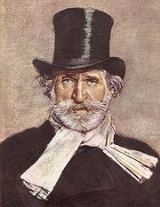
Giuseppe Verdi
Overview
Italy
Italy , officially the Italian Republic languages]] under the European Charter for Regional or Minority Languages. In each of these, Italy's official name is as follows:;;;;;;;;), is a unitary parliamentary republic in South-Central Europe. To the north it borders France, Switzerland, Austria and...
Romantic
Romantic music
Romantic music or music in the Romantic Period is a musicological and artistic term referring to a particular period, theory, compositional practice, and canon in Western music history, from 1810 to 1900....
composer, mainly of opera. He was one of the most influential composers of the 19th century. His works are frequently performed in opera houses throughout the world and, transcending the boundaries of the genre, some of his themes have long since taken root in popular culture – such as "La donna è mobile
La donna è mobile
"La donna è mobile" is the cynical Duke of Mantua's canzone from Giuseppe Verdi's opera Rigoletto . The inherent irony is that it is the callous playboy Duke himself who is mobile...
" from Rigoletto, "Va, pensiero
Va, pensiero
Va, pensiero is a chorus from the third act of Nabucco by Giuseppe Verdi, with words by Temistocle Solera, inspired by Psalm 137...
" (The Chorus of the Hebrew Slaves) from Nabucco
Nabucco
Nabucco is an opera in four acts by Giuseppe Verdi to an Italian libretto by Temistocle Solera, based on the Biblical story and the 1836 play by Auguste Anicet-Bourgeois and Francis Cornue...
, "Libiamo ne' lieti calici
Libiamo ne' lieti calici
Libiamo ne'lieti calici is the most famous duet from Verdi's La traviata, one of the most well known fragments of opera around the world, and an obligatory performance for any great tenor. The song is categorised as a Brindisi, which encourages alcoholic drinking...
" (The Drinking Song) from La traviata
La traviata
La traviata is an opera in three acts by Giuseppe Verdi set to an Italian libretto by Francesco Maria Piave. It is based on La dame aux Camélias , a play adapted from the novel by Alexandre Dumas, fils. The title La traviata means literally The Fallen Woman, or perhaps more figuratively, The Woman...
and the "Grand March
Triumphal March
A triumphal march is a musical form generally reflecting a triumph, victory or great joy.Many composers have written a triumphal march, with maybe the best known one being by Italian opera composer, Giuseppe Verdi for his 1871 grand opera, Aida, where, in the second act, Radames leads the Egyptian...
" from Aida
Aida
Aida sometimes spelled Aïda, is an opera in four acts by Giuseppe Verdi to an Italian libretto by Antonio Ghislanzoni, based on a scenario written by French Egyptologist Auguste Mariette...
Verdi’s masterworks dominate the standard opera repertoire a century and a half after their composition.
Verdi was born the son of Carlo Giuseppe Verdi and Luigia Uttini in Le Roncole
Le Roncole
Le Roncole, or Roncole Verdi, is a village in the province of Parma of Italy, a frazione of the comune of Busseto. It is located c. 140 km southeast of Milan. Today Le Roncole is called Roncole Verdi, named after the composer Giuseppe Verdi who was born there on either 9 or 10 October, 1813...
, a village near Busseto
Busseto
Busseto is a comune in the province of Parma, in Emilia-Romagna in Northern Italy. It was the capital of Stato Pallavicino. Opera composer Giuseppe Verdi was born in the nearby village of Le Roncole and he moved there in 1824...
, then in the Département Taro
Taro (département)
Taro is the name of a département of the First French Empire in present Italy. It was named after the Taro river. It was formed in 1808, when the states of Parma and Piacenza were annexed by France. Its capital was Parma. It was divided into the following arrondissements:* Parma.* Borgo San Donnino...
which was a part of the First French Empire
First French Empire
The First French Empire , also known as the Greater French Empire or Napoleonic Empire, was the empire of Napoleon I of France...
after the annexation of the Duchy of Parma and Piacenza.
Unanswered Questions

